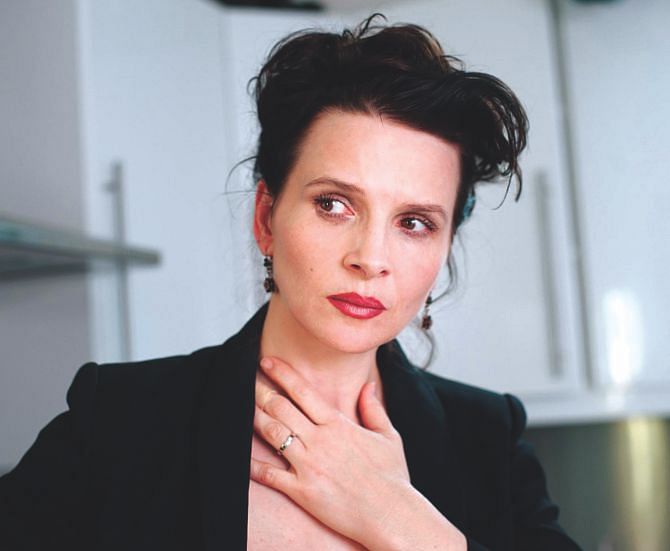Juliette Binoche: The 'ethereal beauty' at 50

Chicago Sun-Times film critic Roger Ebert added the quality “ethereal beauty” to French actress Juliette Binoche in his book. Her beauty remains undiminished at the age of 50. She was born in Paris, France on March 9, 1964 to Monique Yvette Stalens, a director, teacher and actress, and Jean-Marie Binoche, a sculptor, director, and actor.
Binoche is endowed with a look of innocence. Film critics however described her as a tortured soul with a prickly temperament. This is perhaps rooted in a childhood trauma caused by the separation of her parents. She was only two and a half years old at the time. Binoche and her sister Marion were sent to boarding school when she was only four. In the past she called this 'traumatizing' but today she waives it off. Binoche in school-girlish candor observed she that has no anger; rather it has made her stronger!
Although it was not her first movie, Juliette Binoche drew attention with her performance in “The Unbearable Lightness of Being” (1988) directed by Philip Kaufman. She was only 23 and her co-star was the phenomenally gifted Daniel Day-Lewis. The movie deals with a sexually active Czech doctor and a woman who believes in monogamy and the 1968 Czech Revolution begins.
Her next movie was “The Lovers on the Bridge” (1991), a love story directed by Leos Carax. The following one was an English language classic “Wuthering Heights” (1992). Renowned Louis Malle directed Binoche in the movie “Damage” (aka fatale 1992). “Damage” had the morally tantalising subject of a French parliamentarian passionately in love with his son's fiancée.
Outstanding Polish film director Krzysztof Kieslowski gave Binoche the milestone of her film career – “Trois Couleurs: Bleu” (Three Colors: Blue 1993). It is a gem of a movie and La Binoche's performance is was absolutely superb! The colour blue is reflected in the brooding sadness of Julie de Courcy (Vignon) portrayed by Juliette Binoche. Her frozen visage, her sinking interest in life, her listless response towards human ties and possessions after the tragic death of her composer husband and daughter looked so starkly real with Binoche. The discovery of her husband's long-standing extra-marital affair further exacerbated it. She won César and Venice Film Festival Awards for Best Actress for “Trois Couleurs: Bleu”.
The following year in 1994, she took a sabbatical to have a baby boy -- Raphael, born out of her partnership with scuba diver André Halle. She had another child a daughter Hana in 1999. The father was her co-actor Benoît Magimel.
“The English Patient” (1996) directed by Anthony Minghella was the cinematic event of the year, winning nine Oscar Awards including Best Picture, Best Director and Best Supporting Actress for Binoche as Hana the nurse. The movie is set in Egypt's sandy stretches and Southern Italy during the closing stage of World War II, with flashbacks. It deals with the torrid extra-marital love affair of CountAlmásy (Ralph Fiennes) an Englishman of Hungarian descent and a member of Royal Geographic Society, with Katherine Clifton (Kristin Scott), the wife of another expedition member. In a tragic rescue effort, he hands over British documents to the Germans and gets on a German warplane which crashes and he is badly burnt. The English Patient, as the Germans called him, was transferred to occupied Italy. There he is tenderly nursed by a Canadian nurse Hana (Juliette Binoche).The film built Binoche a friendship with Ralph Fiennes.
“Chocolat” (2000), the next well-received film of Juliette Binoche was directed by Lasse Halleström. It is the story of a young unwed mother Vianne Rocher with a six- year- old daughter Anouk who opens a chocolaterie at a small French town, steeped in prejudice and dominated by a conservative mayor. Vianne wins over the villagers with her delicacies and ultimately triumphs over prejudice. Tranquilite or tranquility returns to the town. Johnny Depp is also in the movie as Gypsy singer Roux.
Binoche's next notable movie is “Caché” (“Hidden”) directed by Michael Haneke. Here, she is the wife Anna Laurent of TV literary review critic Georges Laurent (Daniel Auteuil). In a mystery drama, the family is terrorized by a series of surveillance videotapes of Georges and his family members that aggravates to a stage when they receive the drawing of a boy with blood coming out of his mouth. The family remains unnerved and finds Majid, an Algerian who was once raised in his family. The mystery ends with the macabre suicide of Majid.
The writer is a film buff.

 For all latest news, follow The Daily Star's Google News channel.
For all latest news, follow The Daily Star's Google News channel. 



Comments